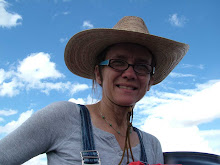Breast health gets voice at summit:
Topics include treatment for the underinsured
By CINDY GEORGE
Copyright 2008 Houston Chronicle
Oct. 24, 2008
Adrienne Evans was a working mom and volunteer in rural West Texas when she felt a lump in her breast two years ago.
Because she had no health insurance, the acupuncturist sought a screening in El Paso. The doctor confirmed her suspicion: She had breast cancer.
Evans recounted her story on Friday to 200 experts, advocates and survivors at the fourth annual Breast Health Summit. The event is presented by the Breast Health Collaborative of Texas, the Susan G. Komen for the Cure Houston affiliate and The Rose, a Houston breast health nonprofit.
Helping other women
Low-income women like Evans are eligible for free or reduced-cost treatment under the state's Breast and Cervical Cancer Services program.
State resources allowed her to have a mastectomy and breast reconstruction. Today, Evans is cancer-free.
"I went from being an uninsured breast cancer patient without enough money to pay for diagnosis and treatment to a healthy woman who found her voice for advocacy," said Evans, 52, who helped form the Big Bend Mammography Coalition to bring breast cancer treatment to rural West Texas.
Her lunchtime talk punctuated points raised earlier by Houston hospital administrators about the growing crisis of the uninsured and underinsured. According to Census estimates released this month, one in three Harris County residents under age 65 does not have health insurance. About 26 percent of Texans lack coverage.
Dan Wolterman, chief executive of the Memorial Hermann Healthcare System, called the underinsured the more serious challenge.
"It is people who do have insurance, but their co-pays and deductibles are so high to bring that premium cost down that when they do have an episode of care, they simply cannot afford it," he said. "It's going to result in a delayed treatment of a medical condition and it also may cause that person their health — and potentially their life — but also cost society a lot more money to treat."
Personal responsibility
Just as belt-tightening and saving are the disciplines of a looming recession, Dr. Ron Walters said personal responsibility for one's health care is necessary in treating cancer these days.
"Waiting for the person to show up with stage three and four disease is not going to cure this disease most of the time," said Walters, a medical director at the University of Texas M.D. Anderson Cancer Center.
David S. Lopez, CEO of the Harris County Hospital District, said the key to better access to health care is patients modifying behaviors and educating health care providers about the realities faced by patients.
Billions could be saved, Lopez said, if Texans would stop smoking, drinking, abusing drugs and overeating — behaviors that contribute to diabetes, obesity, heart disease and cancer.
The Breast Health Summit is an annual advocacy and educational event now held in October to mark Breast Cancer Awareness month.
cindy.george@chron.com
Friday, December 5, 2008
Subscribe to:
Post Comments (Atom)



No comments:
Post a Comment